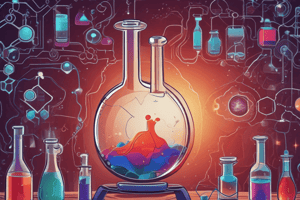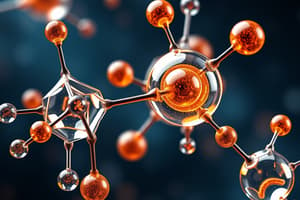Podcast
Questions and Answers
What does reaction kinetics primarily focus on?
What does reaction kinetics primarily focus on?
- Energy changes during reactions
- Identifying ideal conditions for synthesizing products
- Predicting and controlling reaction rates
- How fast reactions occur (correct)
How does organic chemistry contribute to drug discovery?
How does organic chemistry contribute to drug discovery?
- By focusing on carbon-based compounds (correct)
- By studying the chemical properties of drugs
- By measuring drug concentrations in biological samples
- By identifying ideal conditions for drug synthesis
What is the primary focus of analytical chemistry?
What is the primary focus of analytical chemistry?
- Studying energy changes in reactions
- Detecting and measuring analytes in samples (correct)
- Designing innovative materials
- Developing new pharmaceutical drugs
How does materials science contribute to global challenges?
How does materials science contribute to global challenges?
What is a key role of chemists in developing next-generation materials?
What is a key role of chemists in developing next-generation materials?
How does chemistry contribute to enhancing humanity's quality of life?
How does chemistry contribute to enhancing humanity's quality of life?
What is the primary focus of chemistry as mentioned in the text?
What is the primary focus of chemistry as mentioned in the text?
Which type of bond is mentioned as one of the molecular interactions in chemistry?
Which type of bond is mentioned as one of the molecular interactions in chemistry?
What role do elements play in chemistry?
What role do elements play in chemistry?
Why is water mentioned as an example in the text?
Why is water mentioned as an example in the text?
What do chemists aim to achieve by studying molecular interactions?
What do chemists aim to achieve by studying molecular interactions?
Why are covalent bonds, ionic bonds, and van der Waals forces significant in chemistry?
Why are covalent bonds, ionic bonds, and van der Waals forces significant in chemistry?
Flashcards are hidden until you start studying
Study Notes
Exploring Science through Chemistry's Lens
Chemistry is one of those fields within science where you can truly appreciate life's intricate beauty at its most fundamental level. It deals with understanding matter—what it's made from and how different components interact—and its applications span almost every aspect of our daily lives. Let's dive into some of the fascinating facets of studying chemistry and its pivotal role in shaping various scientific disciplines.
Elemental Building Blocks
Chemistry starts by examining elements—the basic building blocks that make up everything around us. These elements combine together to form compounds in specific ratios, each possessing unique properties. For example, hydrogen combined with oxygen forms water—a compound essential to all living beings. Understanding these chemical compositions helps scientists discover new materials for a range of purposes such as medical treatments, energy production, electronics, and countless other areas.
Molecular Interactions
As we delve deeper into chemistry, we uncover molecular interactions like covalent bonds, ionic bonds, and van der Waals forces. These interactions determine whether atoms will bind together to create stable molecules or exist independently. Studying these interactions allows chemists to manipulate matter's structure, creating entirely novel substances with distinct properties.
Reaction Kinetics & Thermodynamics
Reaction kinetics deals with how fast reactions occur, while thermodynamics studies a reaction's energy changes during the transformation process. Both subjects help predict and control reaction rates and identify ideal conditions for synthesizing desired products under safe and economical circumstances.
Organic Chemistry
Organic chemistry focuses on carbon-based compounds found primarily in living organisms. This field plays a crucial role in drug discovery as well as synthetic routes to produce pharmaceuticals, plastics, fuels, and numerous consumer products.
Analytical Chemistry
Analytical chemistry teaches methods to detect, measure, and quantify various analytes present in samples taken from environmental, industrial, biological, or clinical sources. Precise analytical techniques allow researchers to monitor pollution levels, ensure food safety, develop diagnostic tools, and understand metabolic processes occurring inside cells.
Materials Science & Engineering
Materials science blends physics, engineering principles, and chemistry concepts to design innovative materials tailored for specific applications. From lightweight aircraft structures to advanced batteries, chemists play a vital role in creating next-generation materials to tackle global challenges across industries.
In conclusion, chemistry presents a captivating terrain where knowledge intersects with imagination, creativity, and innovation. By embracing this discipline's rich spectrum of topics, we continue pushing boundaries in scientific discovery, technology advancement, and enhancing humanity's quality of life. Whether designing cutting-edge materials for sustainable development, exploring potential drugs to combat diseases, or simply marveling at nature's ingenuity, chemistry is undeniably a treasured jewel in the realm of natural sciences.
Studying That Suits You
Use AI to generate personalized quizzes and flashcards to suit your learning preferences.




